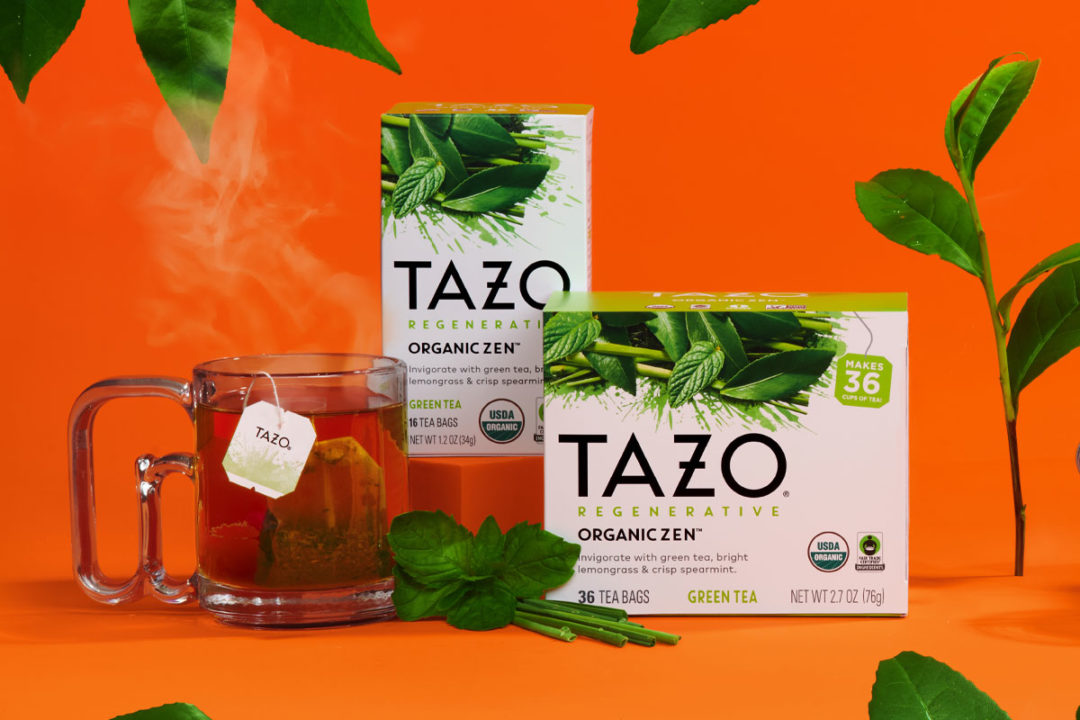“Sustainability: it’s great in theory, but things like recycling and composting only get us so far in helping the earth. We should (and can) do a lot more. Going regenerative means improving every aspect of TAZO’s business: from how we make our tea to ensuring that our farming partners get the fair wages and treatment they deserve. TAZO reformulated and relaunched four of its leading blends this summer. TAZO’s long-term ambition is to transform its products and the brand’s entire business operations into a regenerative approach that challenges what the tea industry can do and gives back to people and the planet.” — TAZO
Listen to the Interview
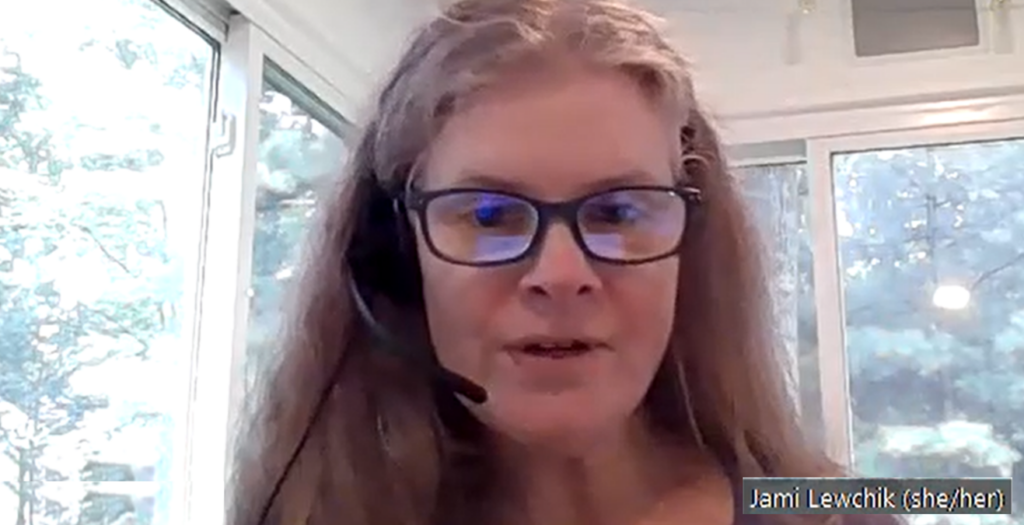
Regenerative: Tea Supply Chain Reimagined
In releasing four new TAZO Regenerative products, parent tea company ekaterra committed to a sizeable long-term investment in its tea supply chain. Jami Lewchik who manages the sustainability portfolio for ekaterra Americas, said the intent is to support farmers, encouraging them to implement practices to increase soil health and assure fairness to farm workers. Third-party certifier Regenerative Organic Alliance (ROA) praises ekaterra for “aligning with our mission: to heal a broken system, repair a damaged planet, and empower farmers and eaters to create a better future through regenerative organic agriculture.”
- See: Ekaterra Tea Transparency | List of ekaterra tea suppliers (21 countries)
Dan Bolton: Jami, will you describe how TAZO’s decision to adopt a regenerative business approach expands on the basic concept of fair trade and sourcing from organic and sustainable suppliers?
Jami Lewchik: Fair Trade and sustainability, of course, are two critical pillars supporting what we’re trying to do. And we’re looking through the lens of regenerative to say, ‘how can we start there?’ and then go further, to get to a place where we’re actually giving back to people and the planet?
What else will it take to improve the way that tea is grown? And that’s where we layered in the regenerative practices and principles.
Fundamentally, from the perspective of the agriculture, we are looking at things such as pollinator pathways for protecting biodiversity, and protecting waterways that may be on the land or adjacent land, ensuring those are cared for.
Many people, I think, are familiar with organic practices and principles, and are now interested in learning more about regenerative but for us, it also goes beyond the land. We’re trying to focus on some key levers to deliver this regenerative ambition. We’re looking at procurement. We’re looking at partnerships, and we’re looking at innovation.
Procurement is where it becomes very interesting, and I think has real implications across the industry, potentially. Packaging materials is another example. We have a commitment that by 2023 will ensure our priority materials like tree fiber, sugar, and tea are sourced from suppliers that have eliminated any deforestation from their supply chains. And by 2025, we are striving to make 100% of our packaging reusable, recyclable, or compostable.
Building resilient communities is one of the first principles, and to address on-the-ground challenges with these experts and partnerships that already exist but are looking for more support from corporate partners like us.
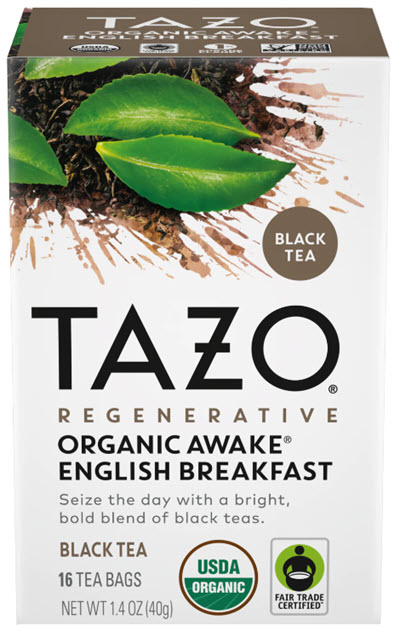
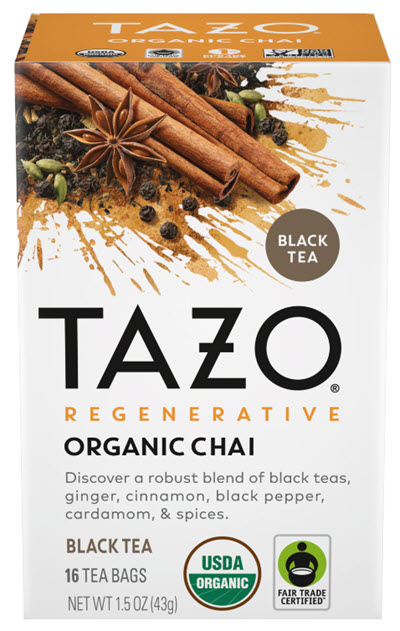
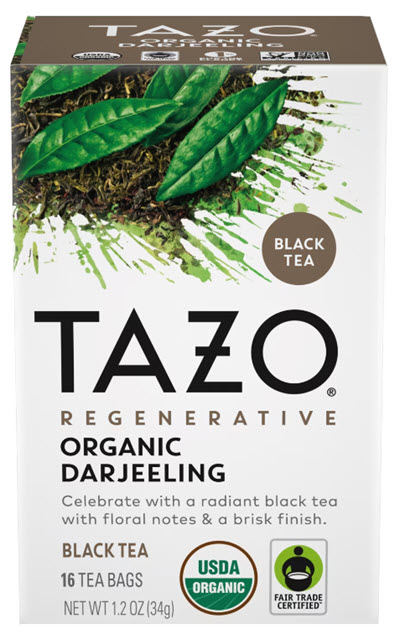
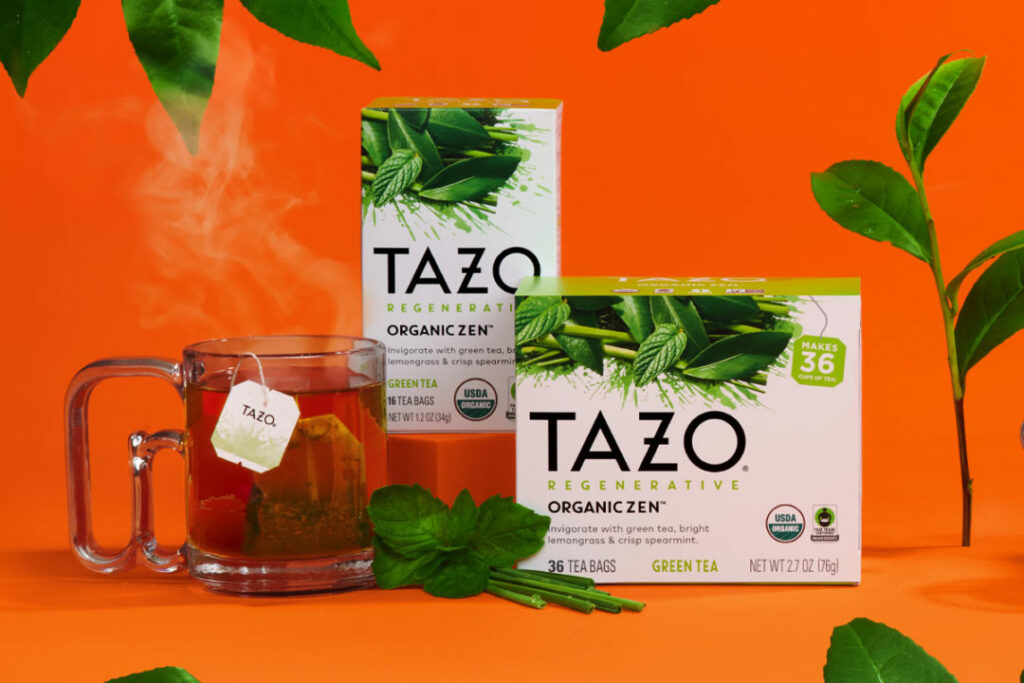
Dan: The initial reformulations begin a long process of achieving third-party certification by the Regenerative Organic Alliance for the full range of TAZO tea. Will you describe the process and milestones?
Jami: We have been working towards this for more than two years. We started by partnering with Pure Strategies, [a consultancy based in Massachusetts] which is our environmental consulting firm. And they helped us do an audit of our existing footprint, first from a product lens, but also from a business and social lens. So, we knew where we were. And then we said where we wanted to go.
We were hoping to find a third party, an independent certification, that would reassure people that there was transparency and that we weren’t grading our own homework. That’s when we first learned of the Regenerative Organic Alliance. We are a proud ally of ROA, but we are not yet certified by them. I do want to make that clear. We are working towards their standards. We understand their framework. And that’s where we brought in the elements of the regenerative practices and principles at farms, and Fair Trade USA and the USDA’s National Organic Program certification as well.
Dan: Marketing should simplify decision-making, and while third-party certifications are powerful endorsements that build trust, labels crowded with too many certification emblems and seals are confusing and dilute the significance of individual claims. In contrast, TAZO’s rebranding incorporates regenerative in the name and displays only two seals on the front of the package. Messaging emphasizes three tea growing principles: organic, conservation, and fair trade.
Jami: It’s a great point, there’s such a world of information out there — and misinformation out there, unfortunately. Right? I’ll use Fair Trade USA as one example. When you see [the certification emblem it represents] the work that’s being done to ensure responsible farming practices and safe, healthy working conditions on the farms, things like gender equity and community development funds to address local needs, and that the farmers and the workers themselves are voting on what those funds are going to be used for. I think there are such rich, informational, educational materials at each of the partners, websites on their social pages, on their LinkedIn. I think that whether it’s the Rodale Institute, the Regenerative Organic Alliance, or Fair Trade USA, these entities are doing a great job of collecting important bits of information for consumers.
It’s my job as a brand owner to then say, ‘here is that information. Here’s why this is important. We’re putting it all together in a box, a literal box for you to enjoy our TAZO tea.’ And so, we feature some of their stories on our website, or in our social conversations on Instagram, for example, or TikTok trying to meet our consumers where they are, where they might be looking for information, and then make that available to them.
TAZO is going regenerative and 1 view = $1 towards fighting the climate crisis. EVERY VIEW is a $1 donation to the #RodaleInstitute, a non-profit and global leader in regenerative organic agriculture for 70+ years
– TikTok reel
Dan: Reports of climate disasters that put tea in harm’s way increased this summer globally, with droughts, floods, and extreme heat in China all impacting yields and tea quality. Will you talk about aspirational aspects of the brand, such as challenging the status quo?
Jami: I want to take a moment to acknowledge especially the situation that’s still unfolding in Pakistan and India. TAZO is an ekaterra brand and this is something that’s near and dear and painful to our hearts, and we are working with the communities on the ground there to ensure that these unprecedented humanitarian issues are being addressed.
Editor’s Note: In September ekaterra donated 100 metric tons of tea, enough for one million flood affected families in Pakistan.
We have responsibility here in the US as well. TAZO is a US born brand. We are calling attention to the climate crisis and how it disproportionately impacts our communities even beyond the tea growing community.
TAZO is partnering with American Forests, a nonprofit that goes back to the 1800s, that is challenging the status quo in a very real and meaningful way with urban forestry and restoring the urban tree canopy. They’re restoring some of the beautiful things that trees give to neighborhoods that have been taken away from communities of color in inner city neighborhoods. Trees contribute to better mental health, better air quality and lower, lower heating and cooling bills — in general, a better quality of life can directly be linked to the amount of trees in your community. We are in five cities, working with Davy Tree certified arborists to recruit and train people in these communities not just to plant a tree and walk away, but to care for it.
TAZO is a member of 1% for the Planet, which means that 1% of TAZO’s sales go directly to non-profit partners who are all working to further our regenerative ambition – including The Recycling Partnership, Rodale Institute, Regenerative Organic Alliance, American Forests, WE ACT For Environmental Justice and Intersectional Environmentalist.
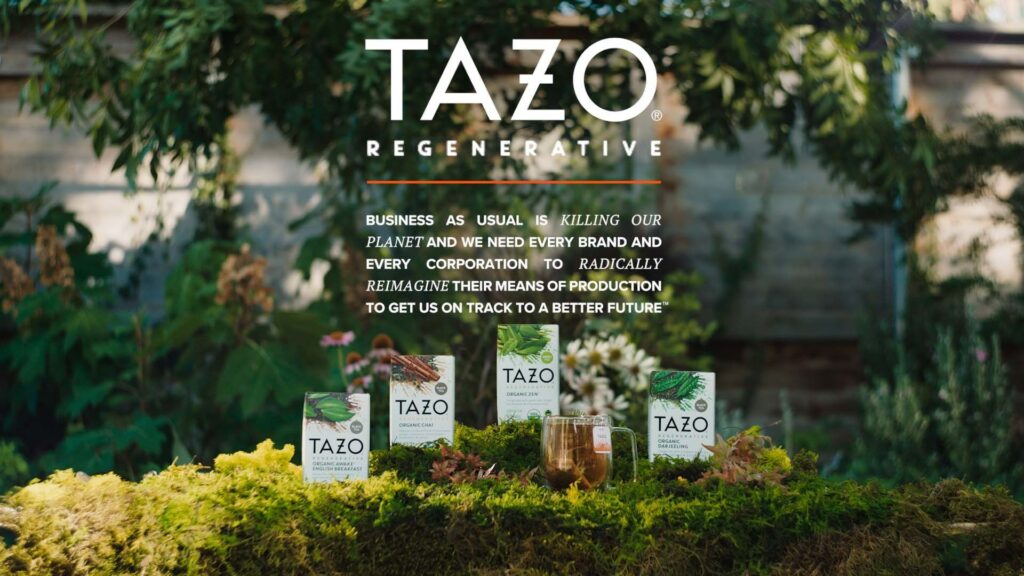
Dan: Earlier this year, the NewClimate Institute issued a report critical of companies trumpeting “ambitious sounding” carbon goals. Nestle and Unilever offered rebuttals. Last month, the UK’s Advertising Standards Authority banned advertising a popular Unilever detergent for unsupported claims about its sustainability. Listeners will find it helpful in your role as head of sustainability if you share insights about consumers’ expectations.
Jami: It’s a very important question. And I think the answers might be something that the consumer has never thought of. In my opinion, consumers are looking for is transparency, and some sort of reliability and reassurance that what the company is promising is true.
I will say for us, we see that businesses must play a role in addressing climate change, because we played such a large role in creating it. Companies, throughout the tea industry, all need to step up and reduce our contributions to greenhouse gas, and address the full climate impact that we’ve created. To make sure that this is done in in a way that is impactful, and measurable, and authentic, and transparent, we think targets for greenhouse gas emissions should be science based [Science Based Targets, initiative]. Validation of science based targets (SBTi) is critical.
At TAZO, our goal is to achieve carbon neutral operations by 2026. And to be on the path to science based net zero emissions, including a 45% absolute reduction of scopes, one, two, and three greenhouse gas emissions by 2030 (our base year is 2020 in that calculation). So that’s first and foremost, I believe that SBTi, the Science Based Targets initiative has built a program, a framework, essentially, that the industry could and should leverage in order to reassure consumers and in order to actually make measurable change.
TAZO is working on our full climate impact by completely overhauling our means of production and transitioning to regenerative organic, as we talked about at the top of the call. So, this is encompassing everything from soil health to worker fairness. You know, we’re a proud ally of the ROA and the Rodale Institute in this space.
We are putting our money where our mouth is. I mentioned how farmers are making real life choices every day on how to address the impacts of climate change on their land. So right now, we are we are raising funds towards the Rodale Institute up to $250,000 to give to them to support farmers who are looking to transition to organic farming. And we are doing that in a, hopefully a cheeky and fun way with a TikTok ad.
We didn’t spend a lot of money to buy media, we didn’t buy TV, we didn’t buy print. We went without paid media, hoping that people would talk about it and generate views. Instead of spending that money on media we’re saying that for each view, it’s $1 donated to the Rodale Institute up to $250,000.
Because by starting a conversation, people start to discuss: What is regenerative agriculture? Why is it important? What are regenerative business practices? Why is fair trade important?
We want to build momentum, we want the conversation to keep going and for consumers to learn more about it, to ask for more of it to drive that sort of flywheel, that virtuous cycle of growth, where the demand increases, where more people want Fair Trade certification. So more farmers and communities are earn Fair Trade certification and earn Fair Trade money.. This is why we’re gonna transition our entire range to be regenerative organic.
We’re setting stringent ambitions. We’re looking for at least 80% of our ingredient volume to meet regenerative organic standards by 2029. The remaining 20% are things like citric acid that aren’t necessarily covered by those standards at this moment in time.
Finally, and most importantly, we are working with our sustainability consulting firm, Pure Strategies, to measure this progress step by step. And we will be keeping our community updated on milestones, through our website and through our social pages.
So, we know we owe those answers to our consumers.
Link to share this post with your colleagues
Signup and receive Tea Biz weekly in your inbox.
